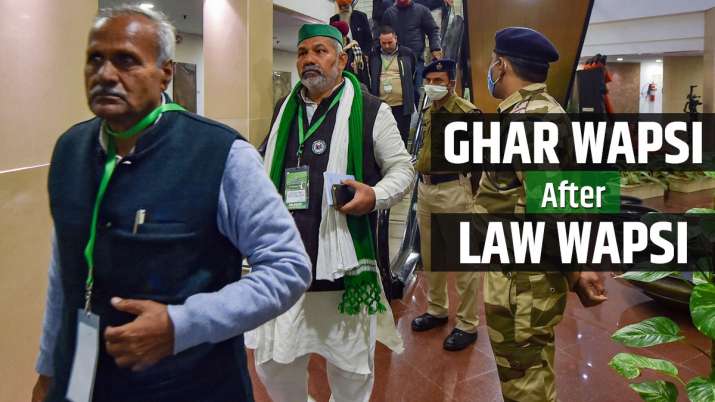Government could not convince farmers even after recent talk.
The protesting farmers' unions have stuck to their call for the complete abolition of the three farm regulations at their ninth round of talks with three union ministers. However, the government has asked them to be more flexible in their approach and expressed their determination regarding the necessary amendments, as both parties decided to have a conversation again on January 19.
Farmer’s leader Joginder Singh Ugrahan told reporters after the meeting that the unions had called on the government to repeal the three laws, but the government was unwilling to do so. "We have decided to meet again on January 19 at 12 noon," he said. Ugrahan said union leaders also raised the issue of NIA attacks on commuters in Punjab, who supported farmers' protests and provided anti-riot services.
At a meeting that lasted about five hours, including a lunch break, farmers' unions said they were committed to continuing to hold direct talks to resolve the issue, as long as a committee was set up by the Supreme Court. In his inaugural address, Agriculture Minister Narendra Singh Tomar urged farmers' leaders to agree with their policies as done by the government. In addition to Tomar, Minister of Railways, Trade and Food Piyush Goyal and Minister of Trade Som Parkash were part of talks with representatives of about 40 farmers' unions. "Both the government and the farmers' unions have reaffirmed their commitment to continue direct negotiations," said Kavita Kuruganti, a member of India's Coordinating Committee, who was part of the meeting.
"In his inaugural address, Tomar ji said he has always said that the government is standing by and making it a problem, even though we have accepted many demands. You do not think you have to be flexible and do not adhere to a single need to break the rules," said Baljit Singh Bali of Punjab Kisan Morcha.
Farmer leader Darshan Pal said there had been a good discussion on all three of the rules. "There may be a solution. We hope," he added. Another leader, Rakesh Tikait, said, "The government has told us that a solution must be found through negotiations and not a court case. Everyone has the same views. There may be some solution." Thousands of farmers, mostly from Punjab, Haryana and west of Uttar Pradesh, have been protesting in various parts of the Delhi border for more than a month now against the three laws.
On January 8, eight talks were still unsettled as the Union ruled to repeal the three controversial laws, seeking support for change across the country. However, the peasants' leaders said they were ready to fight to the death and that their 'ghar waapsi' would only happen after the 'wapsi of the law'. In the sixth round held in December, 2020, another agreement was reached on two demands - the legalization of racism and the continuation of electricity subsidies.
Introduced in September 2020, the government introduced these laws as major changes to farms aimed at increasing farmers' incomes. However, protesting farmers have raised concerns that these laws will undermine low subsidy (MSP) and "mandi" (wholesale market) programs and leave the mercy of large corporations at bay.
The government insists that this fear was put in the wrong place and decided to repeal the laws. The Supreme Court on January 11 had suspended the implementation of the three laws until further notice and appointed a four-member team to resolve the issue. Bhartiya Kisan Union President Bhupinder Singh Mann, however on Thursday resigned from the committee.
Shetkari Sanghatana (Maharashtra) President Anil Ghanwat, Pramod Kumar Joshi and agricultural economist Ashok Gulati are three members of the team.





The Brief. Sign up to receive the top stories you need to know right now.